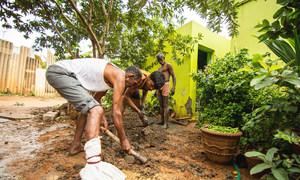
Workers often come into direct contact with human waste, working with no equipment or protection to remove it by hand, which expose them to a long list of health hazards and diseases.

The United Nations has raised concern over the plight of sanitation workers in the developing world, who work without needed tools.
The UN said the matter should be addressed urgently, warning that their rights, health and dignity are at risk.
The UN spoke in relation to a report by the World Health Organisation highlighting the dangers for the millions of people, who clean human wastes with their hands.
WHO insisted that while the workforce performs an essential public service, their own health was compromised and they are often shunned.
The report said, “Workers often come into direct contact with human waste, working with no equipment or protection to remove it by hand, which expose them to a long list of health hazards and diseases.
“It is only when those critical services fail, when society is confronted with faecal waste in ditches, streets, rivers, and beaches or occasional media reports of sanitation worker deaths, that the daily practice and plight of sanitation workers come to light.”
According to WHO, poor sanitation alone causes up to 432,000 diarrhea deaths annually, and it is also linked to the transmission of other diseases including cholera, dysentery, typhoid, hepatitis A and polio.